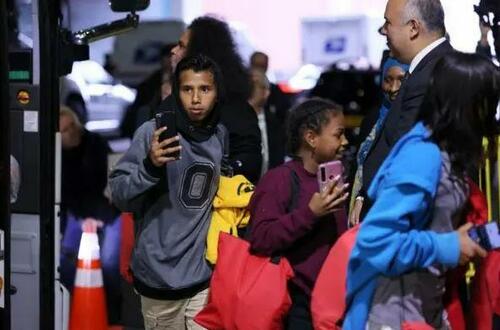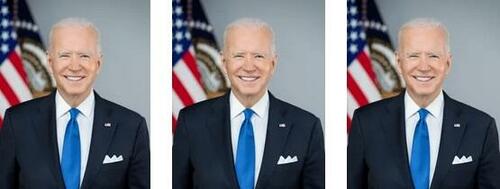This didn’t unconstitutionally burden the parents’ or students’ Free Exercise Clause rights, the court held:
The plaintiffs have not identified any case recognizing a free exercise violation based on indoctrination. The closest any court has come to doing so appears to be Tatel v. Mount Lebanon School District (W.D. Penn. 2022). In Tatel, the court denied a motion to dismiss a free exercise claim brought by parents who challenged a public-school teacher’s non- curricular instruction on transgender topics. The parents alleged the teacher had engaged in a year-long course of instruction to first graders on gender dysphoria, including books, videos, discussions, and private counseling. She also had “instructed the children in her first-grade class that their parents might be wrong about their children’s gender,” told one student that he could dress like a different gender, said she would never lie to them (suggesting their parents would), and encouraged her students “not to tell their parents about her instruction.” Such instruction was “contrary to the District’s published curriculum,” though administrators allegedly had adopted a de facto policy allowing the teacher to continue her activities. The Tatel Court’s basis for finding a burden on the parents’ religious exercise is not clear, but … the court noted that the teacher “did attempt to indoctrinate” the children by telling them their parents “may be wrong and her teachings about gender identity were right.” Later, in summarizing its reason for finding a viable free exercise claim, the court stated the teacher had impermissibly “advocated her own agenda and beliefs about gender identity” in the classroom despite the parents’ objections. The teacher allegedly engaged in a consistent, multi-pronged, year-long effort to convince her first-grade students to believe her views on gender and, in some cases, to change their gender identities. She told her students she would never lie to them, and she encouraged them not to discuss her instruction with their parents. The students were not just exposed to ideas. They were being pressured by their teacher to change their religious views on gender identity.
Here, the plaintiffs have not shown that the no-opt-out policy likely will result in the indoctrination of their children…. [T]he storybooks are still a small subset of many books used in the MCPS English language arts curriculum; they are not a “constant stream of like materials.” Moreover, … the School Board “imposes no requirement that the student[s] agree with or affirm” the books’ views on the topics and threatens no punishment if they refuse to do so. To the contrary, it consistently has stated, “No child, or adult, who does not agree with or understand another student’s gender identity or expression of their sexual identity is asked to change how they feel about it.” ECF 1-5; ECF 43, ¶ 30; ECF 55-3, at 2 (suggesting teachers to respond to student religious objections by saying, “I understand that is what you believe, but not everyone believes that” and “we don’t have to understand a person’s identity to treat them with respect and kindness”). Even if one or two of the suggested answers to possible student questions in the School Board’s guidance could be interpreted to promote a particular view as correct, they are not required answers, and they are outliers among the suggested answers that do not promote a particular view. And some MCPS educators have expressed concerns about the more assertive suggested answers, suggesting those responses are less likely to be used in the classroom. On the current record, the plaintiffs have not shown that MCPS’s use of the storybooks crosses the line from permissible influence to potentially impermissible indoctrination. Therefore, … the Court need not decide whether indoctrination burdens religious exercise.
The plaintiffs contend the Morrisons’ daughter, at least, has a viable indoctrination claim. Their daughter has Down Syndrome and Attention Deficit Disorder. She is enrolled in the Learning for Independence Program, has an IEP, and qualifies for the full-time, one-on-one assistance of a paraeducator. Morrison states her daughter’s learning disability prevents the child from understanding or differentiating instructions from her teachers and her parents and renders her unable to understand how or why her parents disagree with the ideas presented in the storybooks. As a result, Morrison states, it is practically impossible for Morrison and her husband to contradict instruction the child receives at school that conflicts with the family’s religious beliefs….
[But] the Morrisons have not shown the use of the storybooks will result in their daughter’s indoctrination. She may be uniquely vulnerable to indoctrination due to her neurodivergence, but on the current record, the Morrisons still have not established that indoctrination is likely to occur. The evidence suggests that, generally, MCPS teachers will occasionally read one of the handful of books, lead discussions and ask questions about the characters, and respond to questions and comments in ways that encourage tolerance for different views and lifestyles. That is not indoctrination. That the Morrisons’ child cannot distinguish between what her parents and teachers instruct does not convert the teachers’ instruction into indoctrination—nothing suggests she will be pressured to affirm or agree with the views presented in the storybooks. Moreover, the Morrisons have not offered evidence about how the books will be incorporated into the Learning for Independence Program or whether the Morrisons have requested a modification to their daughter’s IEP to accommodate her disability as it relates to the storybooks. Based on the evidence before the Court, the Morrisons are likely to succeed on an indoctrination claim.
Separate from any indoctrination claim, Mahmoud and Barakat contend their son would be forced to violate Islam’s prohibition of “prying into others’ private lives” and its discouragement of “public disclosure of sexual behavior” if his teacher were to ask him to discuss “romantic relationships or sexuality.” Forcing a child to discuss topics that his religion proh[i]bits him from discussing goes beyond the mere exposure to ideas that conflict with religious beliefs. But nothing in the current record suggests the child will be required to share such private information. Based on the evidence of how teachers will use the books, it appears discussion will focus on the characters, not on the students. While some instructional guidance seems to encourage student introspection, none encourages students to share their personal experiences or to discuss their or their families’ romantic relationships, gender identities, or sexuality. Additionally, Mahmoud and Barakat have not established the likelihood that prohibited conversations will occur. They do not allege they have told their son’s teachers that his religion does not allow him to discuss prohibited topics with others or that his teachers, when on notice that he cannot discuss these topics, will pressure him to do so. Thus, the Court cannot conclude the child is likely to be coerced into violating his beliefs in the manner identified by his parents.
The sine qua non of a free exercise claim is coercion, and the plaintiffs have not shown the no-opt-out policy likely will result in the indoctrination of their children or otherwise coerce their children to violate or change their religious beliefs. “Public schools are not obliged to shield individual students from ideas which potentially are religiously offensive, particularly when the school imposes no requirement that the student” violate his or her faith during classroom instruction.
The parents’ burden arguments, too, fall short. The parents assert that their children’s exposure to the storybooks, including discussion about the characters, storyline, and themes, will substantially interfere with their sacred obligations to raise their children in their faiths…. [Bur under various precedents from other circuits], the parents’ inability to opt their children out of reading and discussion of the storybooks does not coerce them into violating their religious beliefs. The parents still may instruct their children on their religious beliefs regarding sexuality, marriage, and gender, and each family may place contrary views in its religious context. No government action prevents the parents from freely discussing the topics raised in the storybooks with their children or teaching their children as they wish. The no-opt-out policy does not prevent the parents from exercising their religious obligations or coerce them into forgoing their religious beliefs.
{The Morrisons, too, do not face any coercion to violate their sacred duty to raise their child in their faith. Morrison states they cannot contextualize contrary ideas for their disabled daughter because her disability prevents her from understanding the difference between what her parents say and what her teachers say. But the no-opt-out policy does not prevent the Morrisons from taking the action required by their religion—trying to teach their daughter their beliefs.}
The plaintiffs further argue … that, even if they remain free to teach their beliefs to their children, their religious exercise is nonetheless burdened because the storybooks impede their efforts to instill their religious beliefs in their children. In other words, they argue instruction that uses the storybooks will make it less likely they will accomplish their religious obligations to raise their children in their faiths. Yet, they cite no case that has recognized a free exercise claim based on government action that reduces the likelihood of meeting a sacred obligation. Such a finding would seem to contravene the Supreme Court’s guidance that the Free Exercise Clause cannot be used to “require the Government itself to behave in ways that the individual believes will further his or her spiritual development or that of his or her family.” It is not enough for a plaintiff to identify “the incidental effects of government programs, which may make it more difficult to practice certain religions but which have no tendency to coerce individuals into acting contrary to their religious beliefs[.]” “The crucial word in the constitutional text is ‘prohibit’: ‘For the Free Exercise Clause is written in terms of what the government cannot do to the individual, not in terms of what the individual can exact from the government.'” With or without an opt-out right, the parents remain free to pursue their sacred obligations to instruct their children in their faiths. Even if their children’s exposure to religiously offensive ideas makes the parents’ efforts less likely to succeed, that does not amount to a government-imposed burden on their religious exercise.
The plaintiffs next argue that the no-opt-out policy is a form of indirect coercion …. They contend the policy pressures them to choose between the benefits of a public education and exercising their religious rights. Indirect coercion, as discussed above, is substantial pressure short of an express command to modify one’s behavior or to violate one’s beliefs. Such pressure may come from conditions on receiving public benefits, which courts have found are analogous to fines.
Certainly, public education is a valuable public benefit. And many families cannot afford to send their children to private schools. But the benefit of a public education in this case is not conditioned on any activity or abstention that violates the parents’ religious beliefs. The no-opt-out policy does not pressure the parents to refrain from teaching their faiths, to engage in conduct that would violate their religious beliefs, or to change their religious beliefs. The policy may pressure them to discuss the topics raised by the storybooks with their children, but those discussions are anticipated, not prohibited, by the parents’ faiths. The parents are not pressured into violating their religious beliefs in order to obtain the benefits of a public education.
Third, the plaintiffs argue the Supreme Court’s decision in Wisconsin v. Yoder (1972) compels the conclusion that the no-opt-out policy interferes with their rights to direct the religious upbringing of their children and teach their religious views on topics central to their faiths. They claim the reading and discussion of the storybooks will interfere with this right by encouraging their children to think about and question their sexuality and gender identity, to focus prematurely on romantic relationships, and to disregard religious teachings….
[But] Yoder is sui generis. The Supreme Court itself said as much, anticipating few groups could match the Amish parents’ claims. The outcome in that case turned on the Court’s findings that the Amish parents’ religious beliefs required them to live apart from the modern world and that their children’s continued enrollment in school would destroy their religious way of life. Thus, the statutory requirement that they send their children to school on pain of criminal punishment coerced them to violate their religious beliefs. The plaintiffs here do not and cannot make a similar claim.
“[A] violation of the Free Exercise Clause is predicated on coercion,” either direct or indirect. The plaintiffs have not shown the no-opt-out policy likely coerces them to violate their religious beliefs. Regardless of the wisdom of affording opt-outs in these circumstances, the weight of existing authority is clear. The plaintiffs’ free exercise claims are not likely to succeed on the merits.
The court also rejected the parents’ parental rights claims. The Supreme Court has held that parental rights secure parents’ rights to send their children to a private school (though not the funding for doing so), but court here concluded—to my knowledge, consistently with past lower court cases—that they don’t include the right to send children to a public school but opt out of particular topics in that public school.
Defendants were represented by many lawyers at Wilmer Cutler Pickering Hale and Dorr LLP.










 (@NOELreports)
(@NOELreports) 
